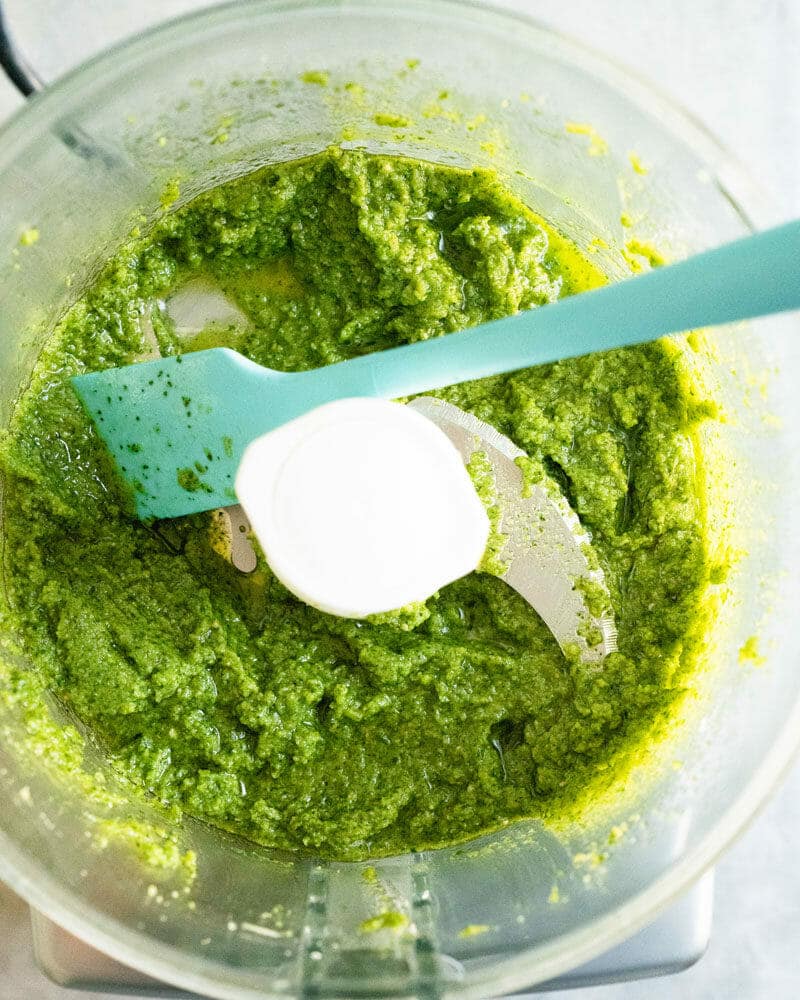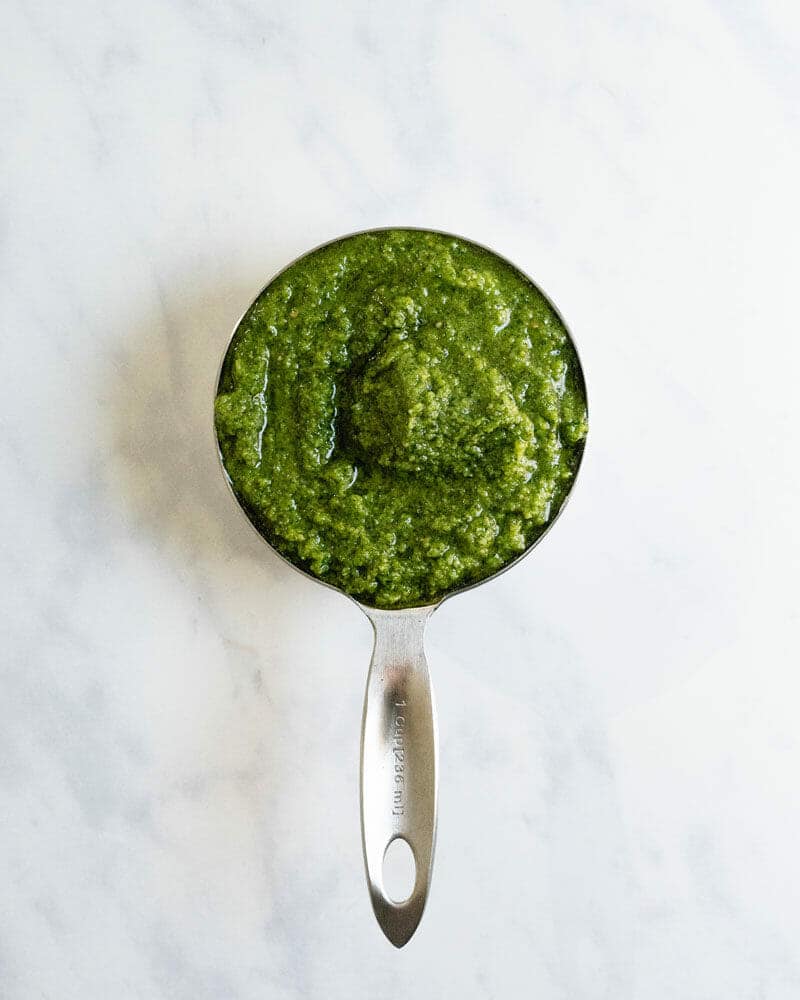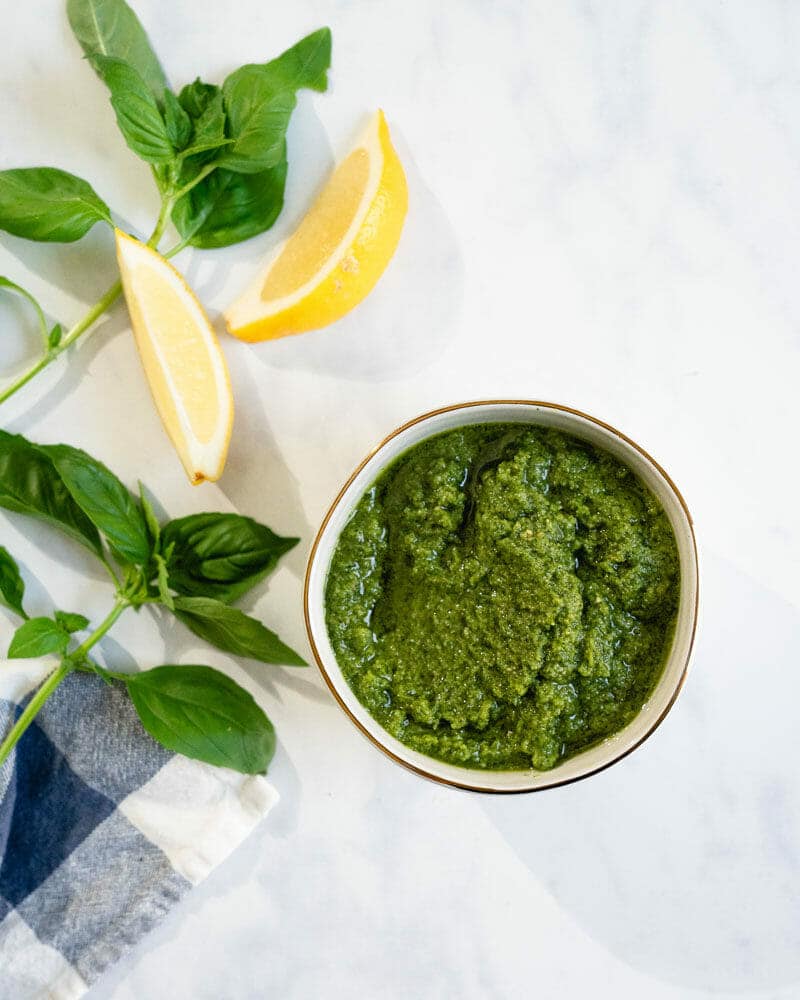This post may include affiliate links; for details, see our disclosure policy.
Can you make pesto with cashews? You bet. This basil cashew pesto is bright green and full of flavor; it tastes just like the classic!

Savory, creamy, garlicky basil pesto: what could be better? With a bushy basil plant in our garden, Alex and I have been whipping up big batches. But can you make pesto using cashews? A traditional basil pesto uses pine nuts, which can be expensive to buy. Cashews are a pantry staple in our house, so Alex and I set about to find out how a cashew pesto would taste. Spoiler alert: it’s delicious! And it tastes just like the classic basil pesto. Keep reading for the recipe!

What is cashew pesto?
Pesto is a sauce that originates from Italy. The most famous version of pesto is basil pesto or pesto alla genovese (pesto that originates from the city of Genoa). But the word comes from the Italian word “pounded”, so it can refer to any type of pounded sauce. You’ve probably seen lots of variations before: red pepper pesto, kale pesto, and so forth. The traditional ingredients in basil pesto are:
- Pine nuts
- Garlic
- Fresh basil leaves
- Parmesan cheese
- Olive oil
- Salt
This cashew pesto recipe uses the traditional ingredients above, but substitutes cashews instead of the pine nuts. Pine nuts have a distinct flavor and can be harder to find here in the US. So Alex and I wanted to create a pesto using pantry ingredients. We always have cashews on hand as a snack, so we wondered whether they’d work in a pesto. Turns out, cashews add a creamy body and make for a delightfully satisfying basil pesto!
Want a vegan version instead?
If you eat mainly plant based and prefer a vegan version of cashew pesto, we’ve got your back! Head over to our Vegan Cashew Pesto.

How to make cashew pesto
To make cashew pesto, you’ll need a food processor, blender, or mortar and pestle. Traditionally pesto is made with a mortar and pestle, but many kitchens these days don’t have one. A food processor makes it the easiest work: using a blender really depends on the size and strength of your blender to get it to blend smoothly. (In this case a smaller, mightier blender is better — you’ll end up with about 1 cup sauce.)
Our cashew pesto has all the same ingredients as a classic basil pesto, with one addition: fresh lemon juice! Adding a squeeze of lemon brightens the flavor. You could omit this if desired, but we like the complexity it adds.
Here’s how to make basil pesto:
- Optional: In a dry skillet, toast the cashews for a few minutes, stirring constantly, until fragrant. (This elevates the nutty flavor of the cashews.)
- To the bowl of a food processor, add the cashews, Parmesan cheese, and garlic and process until finely chopped.
- Add the fresh basil leaves, lemon juice and salt. With the food processor running, add the olive oil in a steady stream until a creamy sauce forms.
You can store the cashew pesto for 1 week in the refrigerator and up to several months frozen.
Looking for a food processor?
You’ll need a food processor for this pizza dough recipe! Here’s the one we recommend. You’ll need a large sized food processor to accommodate this batch.

How to freeze pesto
If you’re not going to eat all your cashew pesto within 1 week, you can easily freeze it to save for later! This is also a great way to use up basil if you have a large basil plant. Alex and I make a bunch of pesto at the end of the season and freeze it: that way we can enjoy the freshness of basil in the winter months!
An easy way to freeze pesto is in ice cube trays! Simply pour the cashew pesto into the squares of an ice cube tray and freeze it. Once it’s sold (after a few hours), pop out the cubes and place them in a sealed freezer safe container.
To defrost the pesto, remove a cube from the freezer and place it in a container: let stand a room temperature or in the refrigerator until thawed.

A note on growing basil
Do you grow your own basil? If not, we highly recommend it! All you need is a sunny ledge and you can plant it in a pot. Or, if you have garden space, you can plant it in full sun! All you need to do is water and harvest it regularly. A pot of fresh basil will revolutionize your summer cooking! Here’s our tutorial on how to grow basil: How to Grow Basil.
Related: 12 Best Basil Recipes

Ways to use basil cashew pesto
If you’ve ended up here, it’s likely you already have some great ideas on how to use cashew pesto! But if you’re looking for more, here are some of our favorites:
- Dollop it on pizza. Our Italian Pizza with Pesto would be a great place to start.
- Throw it into pasta. This Vegetarian Pesto Pasta with Potatoes is a traditional Genovese way to serve pesto.
- Spread it on toast. And top with a little fresh mozzarella and cherry tomatoes. Or burrata. So simple, and so good!
- Use it as a sandwich spread. This Stacked Sandwich with Eggplant and Tomato is so beautiful and colorful, inspired by our trip to Italy.
- Garnish on soup. A swirl of cashew pesto adds big flavor to soups. Try it on our Tortellini Soup or Italian Vegetable Soup with Gnocchi.
This cashew pesto recipe is…
Vegetarian and gluten-free.
Print
Cashew Pesto with Basil
- Prep Time: 5 minutes
- Cook Time: 0 minutes
- Total Time: 5 minutes
- Yield: 1 heaping cup (18 tablespoons) 1x
Description
Can you make pesto with cashews? You bet. This basil cashew pesto is bright green and full of flavor; it tastes just like the classic!
Ingredients
- ½ cup raw cashews
- ½ cup grated Parmesan cheese
- 2 medium garlic cloves
- 2 cups loosely packed fresh basil
- 1 tablespoon fresh lemon juice
- ¼ teaspoon kosher salt
- ½ cup olive oil, plus additional as needed
Instructions
- In a small dry skillet, toast the cashews over medium high heat, stirring constantly, for about 2 to 3 minutes. Remove them to a bowl and allow them to cool slightly. (This step is optional, but brings out a more robust flavor in the nuts.)
- In food processor*, combine the cashews, cheese, and peeled garlic. Process until finely ground, 20 to 30 seconds.
- Add the basil, lemon juice and kosher salt. Turn on the food processor and gradually pour in the olive oil. Once combined, turn off the food processor. Blend in a bit more olive oil if desired, to achieve a looser texture. Stores for about 1 week in the refrigerator and several months frozen.
Notes
*You also can do the same method using a mortar and pestle, adding the basil leaves gradually and crushing them against the sides of the mortar.
- Category: Sauce
- Method: Blended
- Cuisine: Italian
Keywords: Cashew pesto, basil pesto, basil cashew pesto




This turned out really good! We have a fresh basil plant and I wanted to try making pesto. I did use a little more salt which in my opinion enhanced the flavor. Additionally, the oil separated from the other ingredients after my pesto was sitting fro a while so just give it a good stir before you use it :)
Tried making pesto turned out good .made a mistake put basil on fridge day before turned black:(
Made double batch of this pesto. Taste great! The oil separates from other ingredients after a while so give a stir before use.
Mine tastes great but stayed a little chunky and I had already added extra oil…any ideas? Thanks! It’s yummy!
Thanks for letting us know! What kind and size of blender / food processor are you using?
can i use basil stalks also,, ? or just the leaves ?
You can use the basil stalks if you like! Make sure they’re fully washed.
Hi! Im a firstimer to make pesto. What kind of basil leaf should i use for cashew pesto? Is it sweet basil or thai basil? Thankyou
★★★★★
Sweet basil!
I tried in my new nutribullet blender, 2L. One person suggested soaking the cashews first but not sure how that would affect the toasting! Flavor so yummy, just need to figure out how to make it more creamy.
I found that how creamy it is depends on the blender. First of all, a food processor won’t do it. Great for a lot of stuff, but not to get food finely blended and creamy. Most blenders also just don’t have the big guns to really liquefy, no matter how the control buttons are labeled. So I took the plunge and bought a VitaMix. THAT is a machine. Creamy pesto without a hitch. A lot of money, but worth every penny. OR…you can do it like Nonna did it in Genoa and pound the mix into submission with a mortar and pestle.
Nice but way too much garlic !!!
This is a keeper. I made a double batch because the basil in my garden is bountiful this year. One thing, though. I was worried the raw garlic would overpower the other flavors, so I slivered and toasted the garlic lightly and it added another delicious flavor to the mix.
★★★★
Excellent recipe! In addition to the basil pesto, I also made an arugula pesto which turned out beautifully as well.
★★★★★
This is awesome. I am low oil , so I used little
★★★★★
Pine nuts come from the pinyon tree, which is native to the american south-west. So it is a little strange to say that they can be “harder to find here in the US”.
Granted, you won’t find them on convenience store counters when they are in season outside of Utah, Arizona, New Mexico, and Colorado – they are surely harder to find outside of the US.
Hi! In Europe pine nuts are harvested from different types of trees.